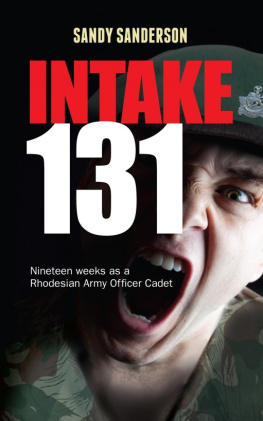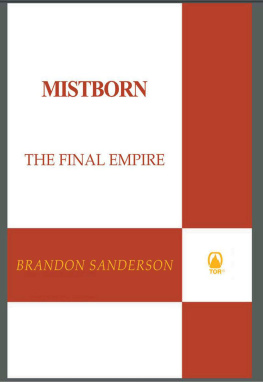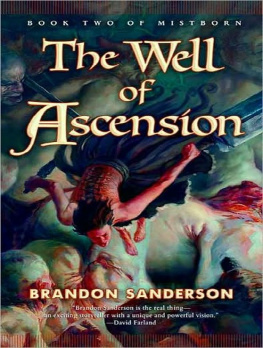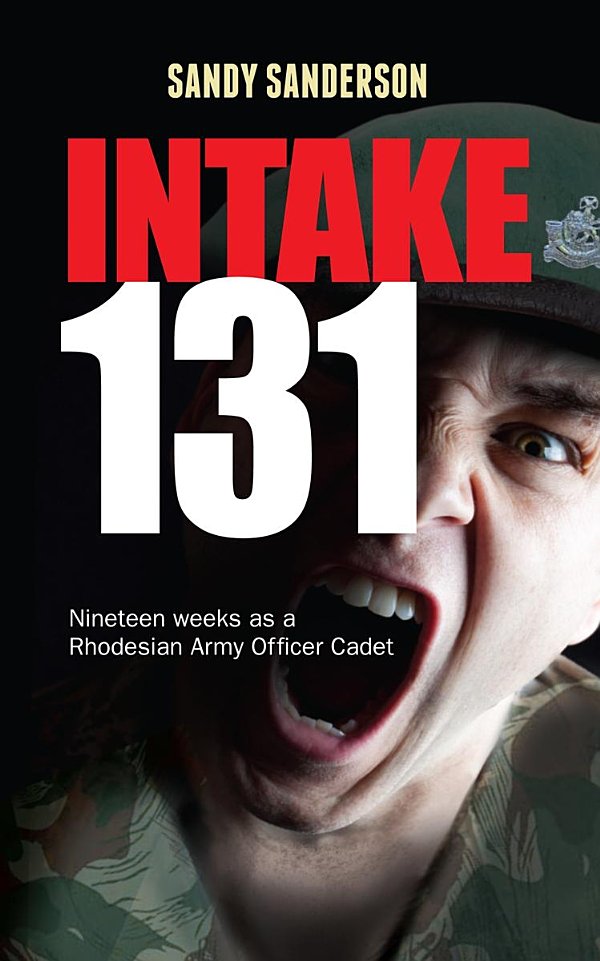
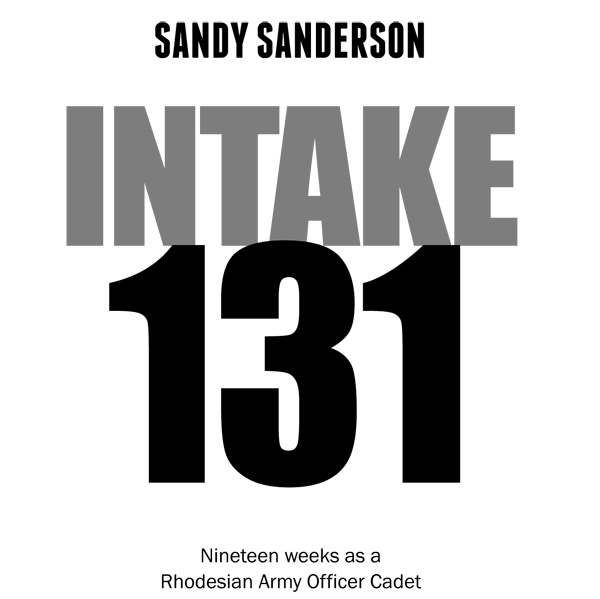
SANDY SANDERSON
INTAKE 131
Nineteen weeks as a Rhodesian Army OfficerCadet
________
Copyright 2015 by Sandy Sanderson
Smashwords Edition
First published in Great Britain in 2015 by MereoBooks, an imprint of Memoirs Publishing
Sandy Sanderson has asserted his right under theCopyright Designs and Patents Act 1988 to be identified as theauthor of this work.
A CIP catalogue record for this book is availablefrom the British Library.
This book is sold subject to the condition that itshall not by way of trade or otherwise be lent, resold, hired outor otherwise circulated without the publishers prior consent inany form of binding or cover, other than that in which it ispublished and without a similar condition, including this conditionbeing imposed on the subsequent purchaser.
The address for Memoirs Publishing Group Limited canbe found at www.memoirspublishing.com

Mereo Books
1A The WoolMarket Dyer Street
Cirencester Gloucestershire GL7 2PR
An imprint of Memoirs Publishing
www.mereobooks.com
ISBN: 978-1-86151-336-6
Dedicated to the boys and old boys of Prince EdwardSchool who lost their lives during the Rhodesian War.
CONTENTS
Preface
Thisrecollection of nineteen weeks spent at School of Infantry, Gwelo,Rhodesia, from April to August 1973, during the dry winter has comeabout as a result of my keeping a diary, for the first and onlytime in my life, and managing to add a substantial entry each andevery day. Without that, this account would not havematerialised.
These nineteen weeks constituted the trainingpart of my National Service. National Service had been four and ahalf months until early 1965, then nine months until late 1972 andthen, starting in January 1973, just short of a year.
I dont really know what prompted me to takethe trouble to write the diary. Perhaps, essentially, I wanted afairly comprehensive record of what was to happen during training.I used ten Croxley Pen Carbon Books.
There are no heroic acts in this account.Several of our officers and instructors were heroes with gallantrymedals to prove it but for us, the national service Officer Cadets,it was a case of mudding through as best we could. Our civilianmentality must have been very trying for those training us.
I have strived to present an accurate recordof what happened with no embellishments and nothing apocryphal. Ihope I have succeeded. In the body of the manuscript and index,ranks of Rhodesian Army personnel are given as they were in 1973 or1967. The rank structure and insignia were identical to the BritishArmy but with the Rhodesian lion replacing the crown.
Reading through my diary, it seems to me thatwe covered much during those four and a half months and that thetraining was very thorough, with a strong emphasis on the academicas well as the practical. I have made a point of describing indetail what we were taught, what we were trained in and how thistraining took place.
In this account I give the composition of theRhodesian Army in 1973. I realise that this is not completelycomprehensive but it does give a good general idea. I alsoelaborate on the nature of tactics taught to us in 1973 at PlatoonCommander level. Most of this can be found with a careful search onthe internet: try looking up section battle drills or Drakeshoots - so there are no trade secrets given away!
I also include comment, in some cases, onwhat happened after the 1973 events recorded in my originaldiary.
The Rhodesian War came about as a result ofRhodesias Unilateral Declaration of Independence on 11 November1965, thus maintaining a white majority government and denyingunimpeded progress towards universal franchise. Africannationalists decided that only through the barrel of a gun wouldthey achieve this and decided to train outside the country, arm,courtesy of the Eastern European states, and infiltrate.
In 1973 the Rhodesian War (1965-1979) wasrestricted to the north east of the country (called the HurricaneOperational area) with an escalation initiated by attacks on farmsnear Mount Darwin in December 1972. The escalation intensified withthe withdrawal of Portuguese armed forces from Mozambique in 1974and 1975 when the country was given its independence, hence freeingup a huge slice of the Rhodesian border for infiltration. Thisresulted in other operational areas being opened up as time wenton.
Necessarily, I suppose, things are describedas I saw them and although I have tried to put the other personspoint of view across, even this is as I remember it. I haveincluded a few memories, not of my own but of others. In thisregard I would like to acknowledge help from Digby Neuhoff, CharlieLenegan and Pete Addison, who were with me on my course and arementioned often. I would also like to acknowledge the considerablehelp I have been given by WO2 Reg Ayling, Lieutenant Colonel JerryStrong MLM BCR and Brigadier Vic Walker SM & Bar MMM JCD withregards to Rhodesian Army personnel and establishment. BrigadierWalker was a Major in 1973 and is also mentioned in my book.
Our experience was tougher than some and notas tough as others but followed the general format of the basictraining that all men in the armed forces went through.
Part and parcel of the whole thing were thechoice phrases, varied, colourful and more often than not profane,which were regularly used by our trainers. Any Rhodesian drillinstructor could string a sentence together consisting entirely ofexpletives, apart from the odd indefinite article, and make perfectsense.
Being an Officer Cadet made no difference toour treatment in this regard. Certainly we were never called sir,as is the case for Officer Cadets in the British Army.
Over the years friends and family, inparticular my wife, Patsy, have suggested that I publish the diaryin the form of a short book. They felt it would provide a detailedaccount of basic training as it was in the early seventies in theRhodesian Army and that people would find it interesting,especially those who had been through it. Whatever unit we were in,all of us experienced basic training. It would certainly evoke manymemories of things half-forgotten.
All this happened over 40 years ago, quite along passage of time, and men from our course are now into theirsixties. Certainly anyone involved in the war in Rhodesia as amember of the services would now have to be at least in theirfifties. Perhaps publication is not before time.
I. M. Sanderson | March2015
Wednesday 11 April 1973
I had finished twodays leave from my job as an Internal Affairs Cadet in Karibapending a years National Service and had come from the JamesonHouse staff pub at Prince Edward School. This is the school where Ihad taught until the end of 1972 before taking the job withInternal Affairs.
Piet de Bruijn, a teacher of Afrikaans atPrince Edward, had kindly given me a lift to the Salisbury stationto catch the troop train to Bulawayo. It had been an excellentevening so far; a couple of beers and a couple of laughs in goodcompany. Now the tough times were to begin.
Most young men about to start NationalService, if they were honest, felt a certain amount ofapprehension. There were the stories from the old sweats aboutextremely dangerous Sergeant-Majors, shine parades and hours ofdrill on the bitumen square with, from all accounts, very littlesleep.
Next page
